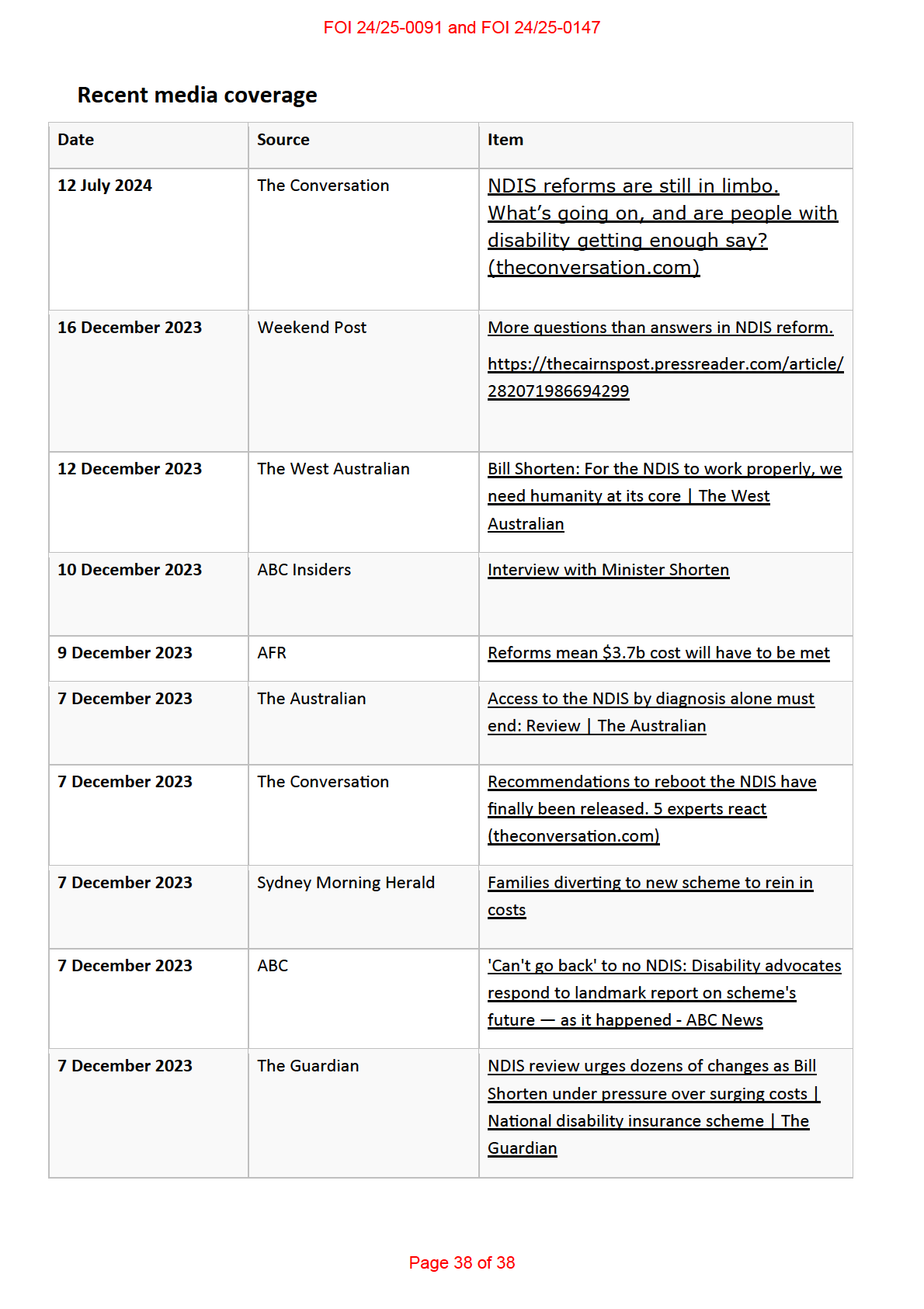FOI 24/25-0091 and FOI 24/25-0147
DOCUMENT 1
NDIS AMENDMENT (GETTING THE NDIS BACK ON TRACK NO. 1) BILL 2024
PUBLIC HEARING - 25 JULY 2024
BRIEFS
NDIA APPROACH TO CO-DESIGNING THE LEGISLATION REFORM ................................... 3
IMPLEMENTATION: LEGISLATION ................................................................................ 11
TRANSITIONAL ARRANGEMENTS ................................................................................. 17
FRAUD AND COMPLIANCE (INCL FRAUD FUSION) ........................................................ 23
NDIS REVIEW ................................................................................................................ 31
Page 1 of 38

FOI 24/25-0091 and FOI 24/25-0147
NDIS AMENDMENT BILL HEARING
TITLE:
NDIA APPROACH TO CO-DESIGNING THE LEGISLATION REFORM
WITNESS: Mr Matthew Swainson, Acting Deputy Chief Executive Officer,
Goverance, Risk and Legal
Strategic Narrative
• Our obligation to co-design with people with disability has been
enshrined in legislation since 1 July 2022.
• The NDIA is committed to working with the disability sector to design
and manage co-design, consultation, and engagement activities across
al reforms. This is reflected in the shared statement on co-design,
released in partnership with the Independent Advisory Council (IAC) and
Disability Representative and Carer Organisations (DRCOs).
• The proposed changes to the
National Disability Insurance Scheme Act
2013 (NDIS Act) is the Government’s first step, post the Independent
Review of the NDIS (NDIS Review), to put in place the scaffolding needed
to start making the NDIS stronger and to improve outcomes for NDIS
participants.
• Those directly impacted by key decisions about the Scheme wil continue
to play a key role in developing the detail and in implementing the
reforms.
• The NDIA wil work with people with disability and the disability
community to design rules and to implement legislation, and to design
operational guidance and practice.
Page 3 of 38
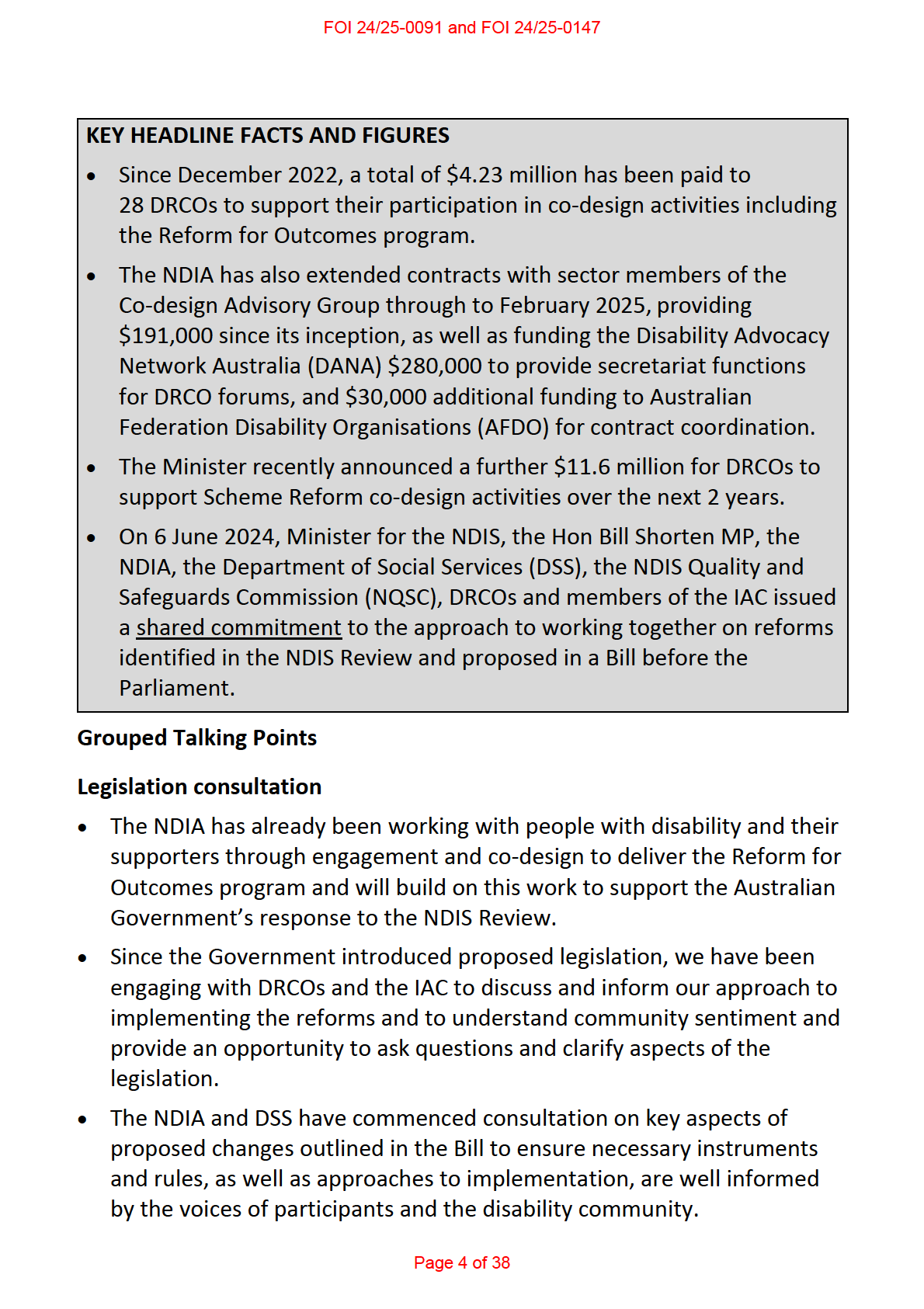
FOI 24/25-0091 and FOI 24/25-0147
• This has included consultation sessions on:
- Proposed changes to section 33 that would introduce a total funding
amount, funding limits for specific supports and funding periods to
NDIS plans.
- Proposed definition of NDIS Supports and associated draft
transitional rule to support proposed changes to section 10.
• Consultation sessions have so far been held with:
- Better Planning co-design working group (section 33 only)
- IAC
- DRCOs
- Participant Reference Group
• Further sessions are planned with focus groups of participants (through
Participant First), our Industry Chief Executive Forum and other key
advisory groups such as our Employees with Disability Network.
• In addition to this, DSS is leading consultation with state and territory
governments and is planning a public engagement process.
Co-designing reforms
• The intent is that the principles of co-design remain central to al reform
activity occurring in the NDIA.
• The priority is to co-design with the disability community and as much as
possible directly with people with disability – however, other key
stakeholders wil continue to be consulted, including service providers
and governments.
• Since the Government introduced proposed changes to the NDIS Act, we
have been working closely with DRCOs, our IAC and Participant
Reference Group (PRG) to confirm the next set of priority topics for co-
design and improve our approach to co-design.
• We have agreed to prioritise co-design, consultation and engagement
activities on the following topics:
- Participant pathway experience (including access and planning)
- Assessments and budgeting
- Navigator Function
Page 5 of 38
FOI 24/25-0091 and FOI 24/25-0147
- Participant Services (market reforms)
- Psychosocial Disability
- Home and Living
- Integrity and Fraud Prevention
- Workforce Capability and Culture
- Participant Safety
- Supporting Children and Young People in the NDIS
• The NDIA has committed to broadening our co-design activities, so we
are hearing from more people with greater diversity.
• Existing engagement, co-design and consultation activities wil be
expanded to include a larger and more diverse range of people with
disability as wel as experts, providers, partners in the community and
other necessary stakeholders.
• This wil include working with existing and new advisory groups
(for example, Autism Advisory Group, National Mental Health Sector
Reference Group, etc.) and national representative and peak bodies who
help us work with harder to reach communities and represent diverse
cohorts of people with disability.
• The NDIA is also in the process of establishing a smal number of new
expert advisory groups to provide advice across co-design topics.
This includes new expert advisory groups on:
- Children and young people
- Neurodegenerative conditions, pal iative care and rare diseases
- Rural and remote
- Self-management
• The NDIA Engagement Framework (Framework) – available on the NDIS
website– outlines our commitment to co-designing with the disability
community. The Framework was developed with disability sector
representatives to guide, support, and strengthen our engagement with
the disability community.
• It also recognises the spectrum of activities that may occur – from
seeking community feedback to co-creating solutions alongside service
users – and can take place across a broad range of topics and issues.
Page 6 of 38
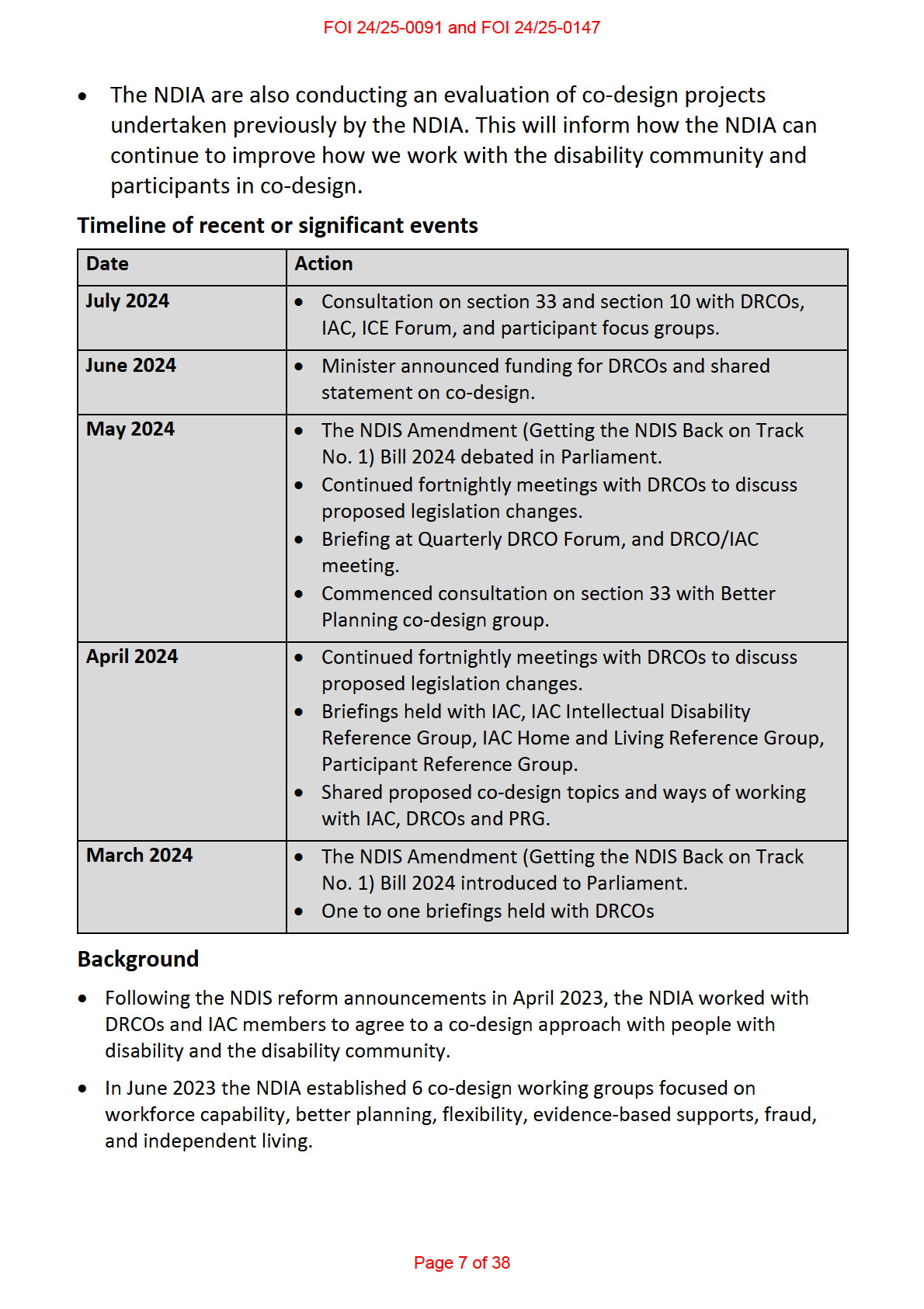
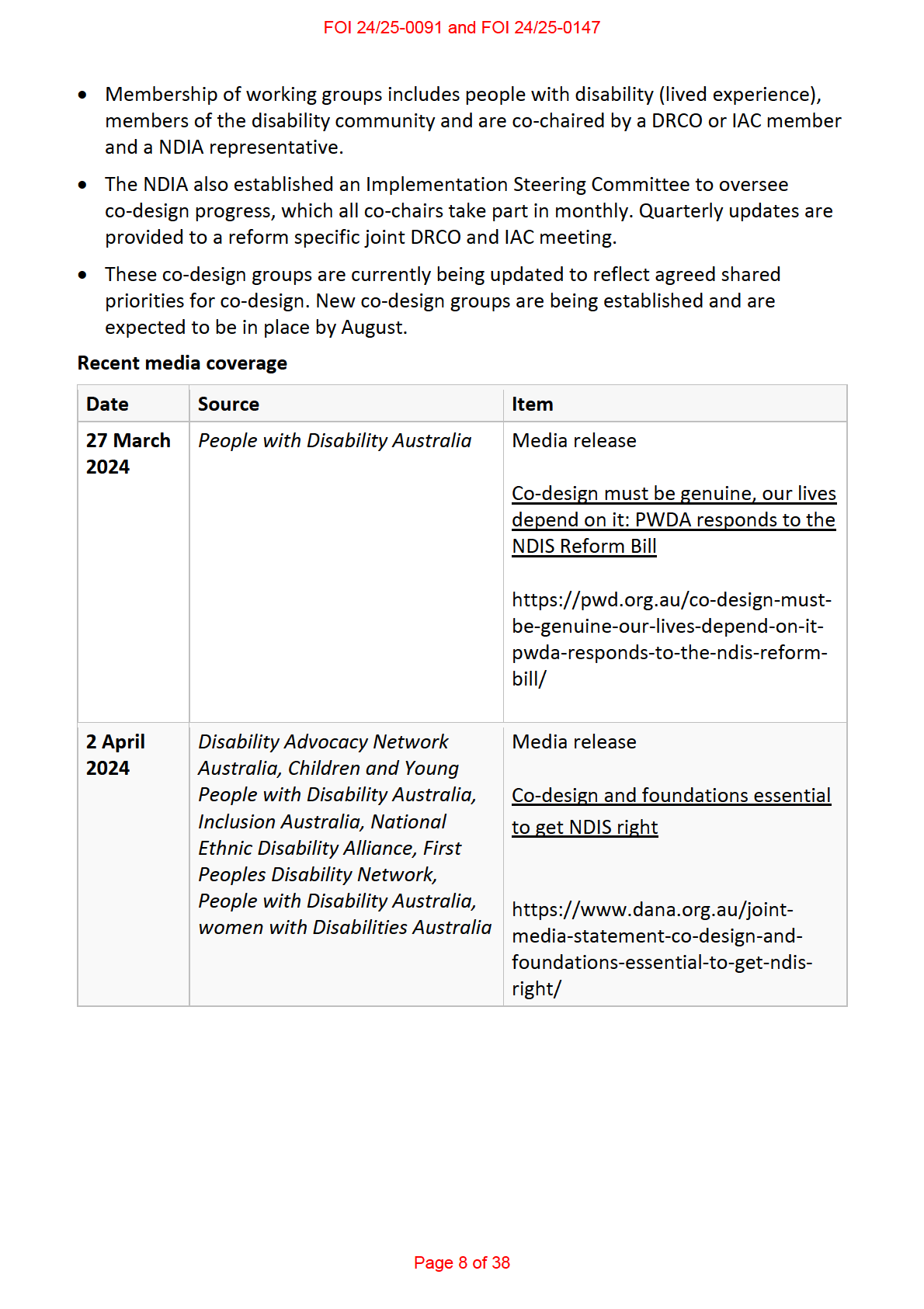
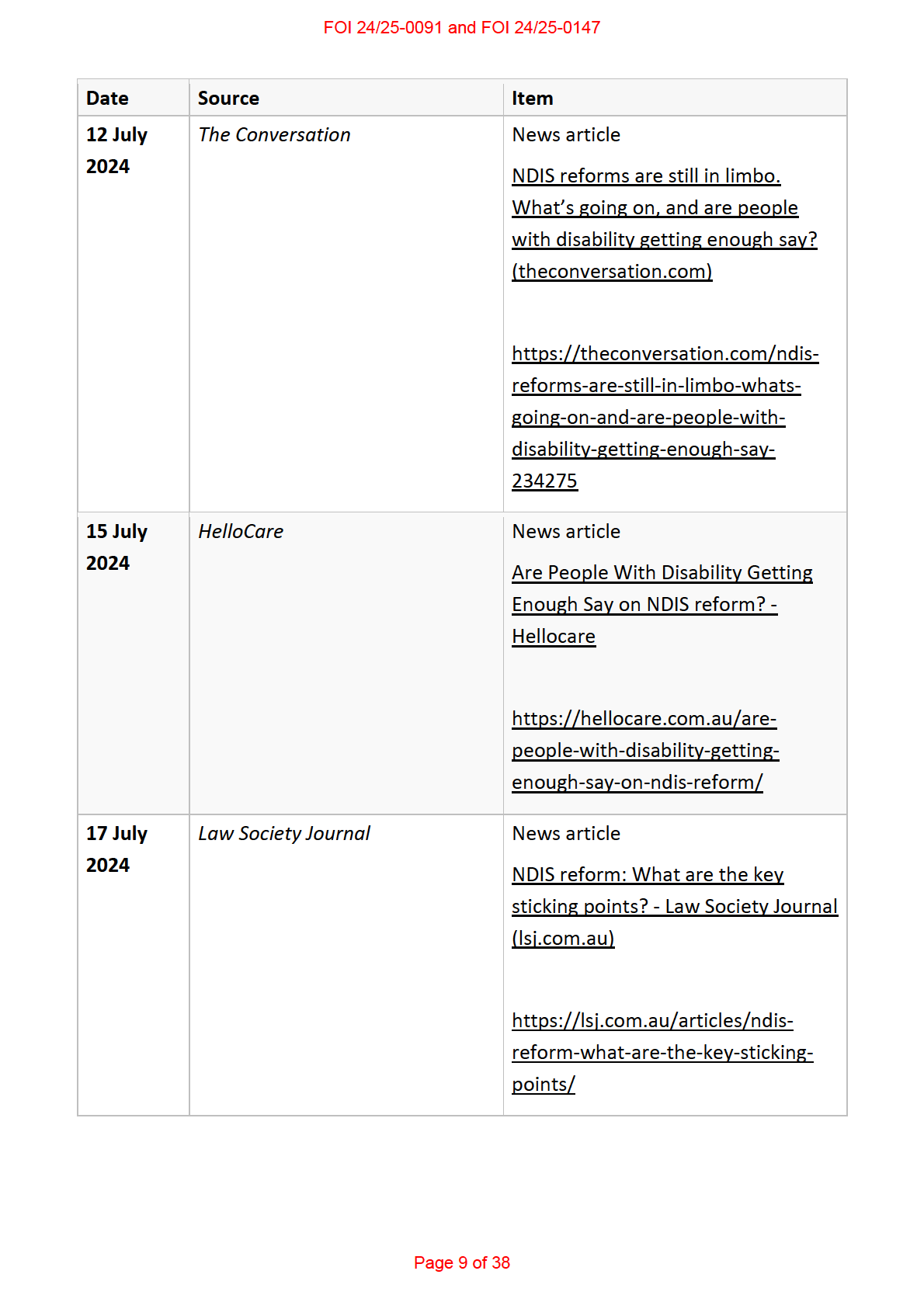


FOI 24/25-0091 and FOI 24/25-0147
NDIS AMENDMENT BILL HEARING
TITLE:
IMPLEMENTATION: LEGISLATION
WITNESS: Mr Matthew Swainson, Acting Deputy Chief Executive Officer,
Goverance, Risk and Legal
Strategic Narrative
• The principles of co-design remain central to al reform activity occurring
in the NDIA.
• The Agency is committed to ensuring the design and implementation of
the proposed changes wil include extensive consultation and co-design
with the disability community.
• This wil be achieved through working together with the disability
community to design and implement legislative instruments to ensure
people with disability remain at the centre of the Scheme.
• The NDIA’s focus in implementing the legislation wil be on
communicating with and supporting participants, their families and
supporters so that people understand and feel confident about the
proposed changes.
Possible timeline for passage of the Bil , subject to passage in the
Parliament and prioritisation of instruments
Page 11 of 38
FOI 24/25-0091 and FOI 24/25-0147
Sequencing of reform activities
• The Bil provides the architecture to enable the time to careful y
co-design rules to commence alongside Foundational Supports.
These rules wil need to be implemented with agreement from states
and territories – which means that key changes can be ‘switched on’
as additional Foundational Supports are available.
• The Government, Department of Social Services (DSS) and the NDIA wil
work with states and territories and the disability community to plan the
commencement of new access and planning arrangements.
Reform delivery approach
• As recommended by the Independent Review of the NDIS (NDIS Review),
the NDIA has put in place reform coordination arrangements which
focus on the experience of participants in accessing and being supported
by the Scheme.
• The change impact on internal and external stakeholders is a key
consideration in decisions on when reform initiatives wil be deployed.
This includes changes and reforms which relate to Agency capability,
such as implementation of our new computer system.
Legislation Implementation approach
• The NDIA wil work with people with disability and the disability
community to design rules and to implement legislation.
• The NDIA and DSS have commenced consultation on key aspects of
proposed changes outlined in the Bil to inform transitional rules and to
ensure approaches to implementation are informed by the voices of
participants and the disability community.
• This has included consultation sessions on:
- Proposed changes to section 33 that would introduce a total funding
amount, funding limits for specific supports and funding periods to
NDIS plans, and
- Proposed definition of NDIS Supports and associated draft
transitional rule to support proposed changes to section 10.
• DSS wil also lead public engagement on priority instruments.
Page 12 of 38
FOI 24/25-0091 and FOI 24/25-0147
• All consultation activity will be collated and tabled as part of the
Explanatory Statement to the legislative instruments.
• The NDIA’s focus in implementing the legislation wil be on
communicating with and educating participants about the changes and
putting in place operating arrangements to support participants in the
change.
Legislation timeframes
• The legislation wil commence 28 Days from Royal Assent. Current NDIS
plans wil immediately be referred to as ‘old framework plans’.
• Some of the proposed provisions wil come into effect immediately and
apply to old framework plans. These adjustments wil make the
legislation clearer and reinforce the original intent of the Scheme.
• The New Planning Framework is anticipated to commence around July
2025 and wil enable participant plans to be built to include a reasonable
and necessary budget, rather than identifying reasonable and necessary
supports line-by-line. This change will give participants more flexibility to
use their plan to support their needs.
• The NDIA anticipates that legislative instruments for new framework
planning wil be introduced to enable participants to begin transitioning
to new framework planning. The Bil provides for a 5 year timeline from
commencement for the transition of participants to new framework
plans.
Background
• The Bil was introduced into the Australian Parliament on 27 March 2024.
• Some elements of the legislation can be implemented as soon as the Bil comes into
effect.
• Other elements can only be implemented when further work has been undertaken
(such as the design of the participant pathway).
Page 13 of 38
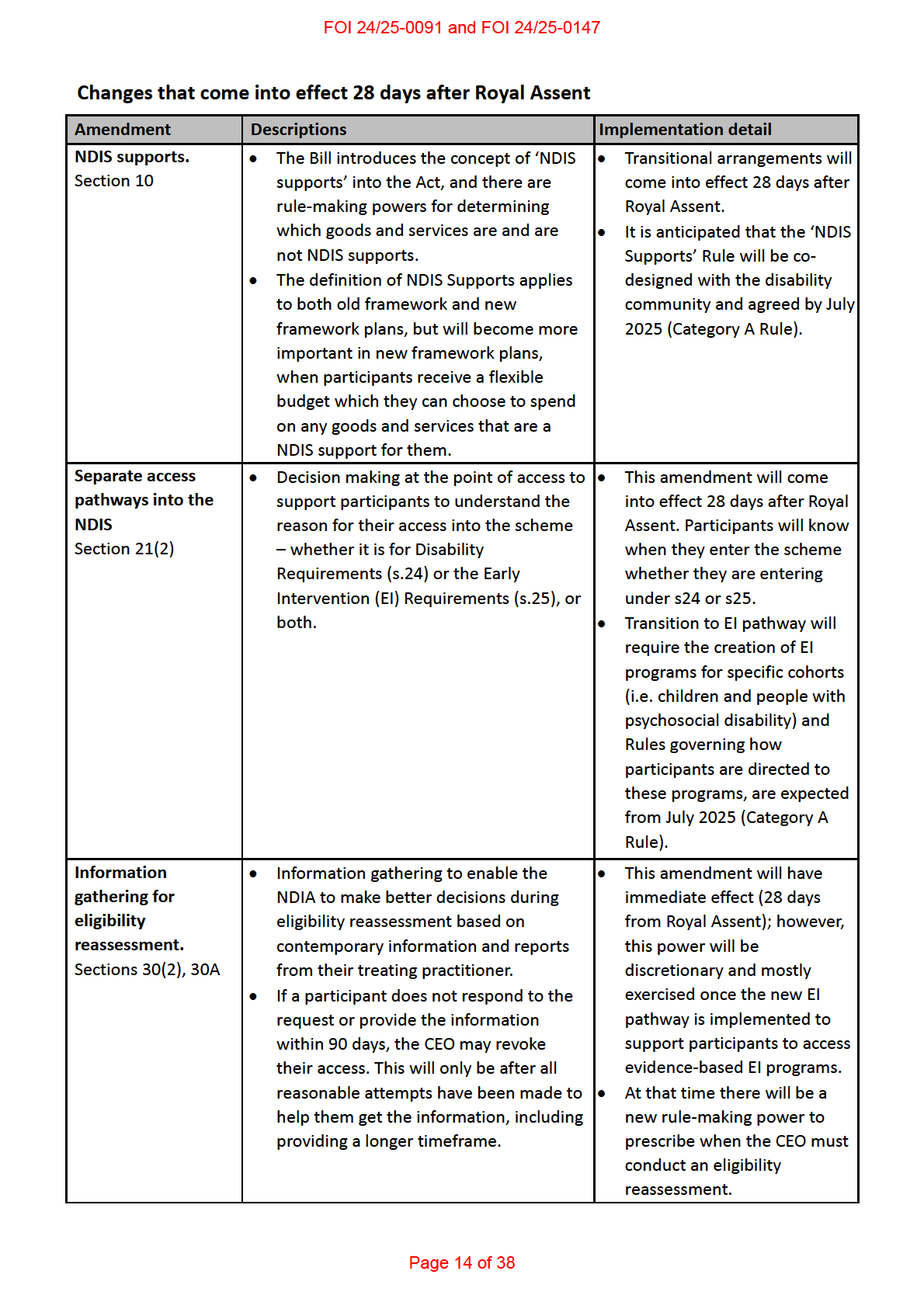
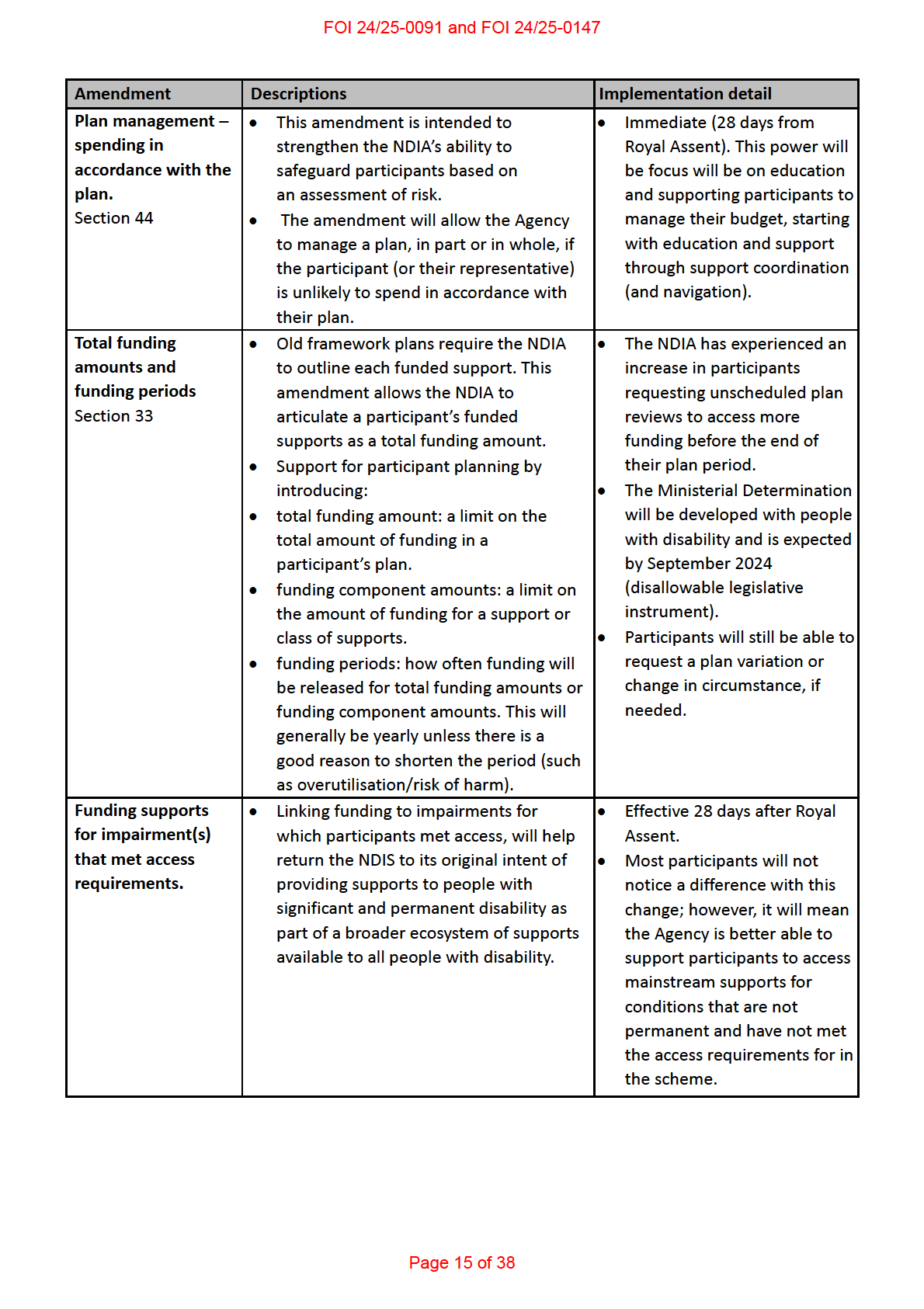
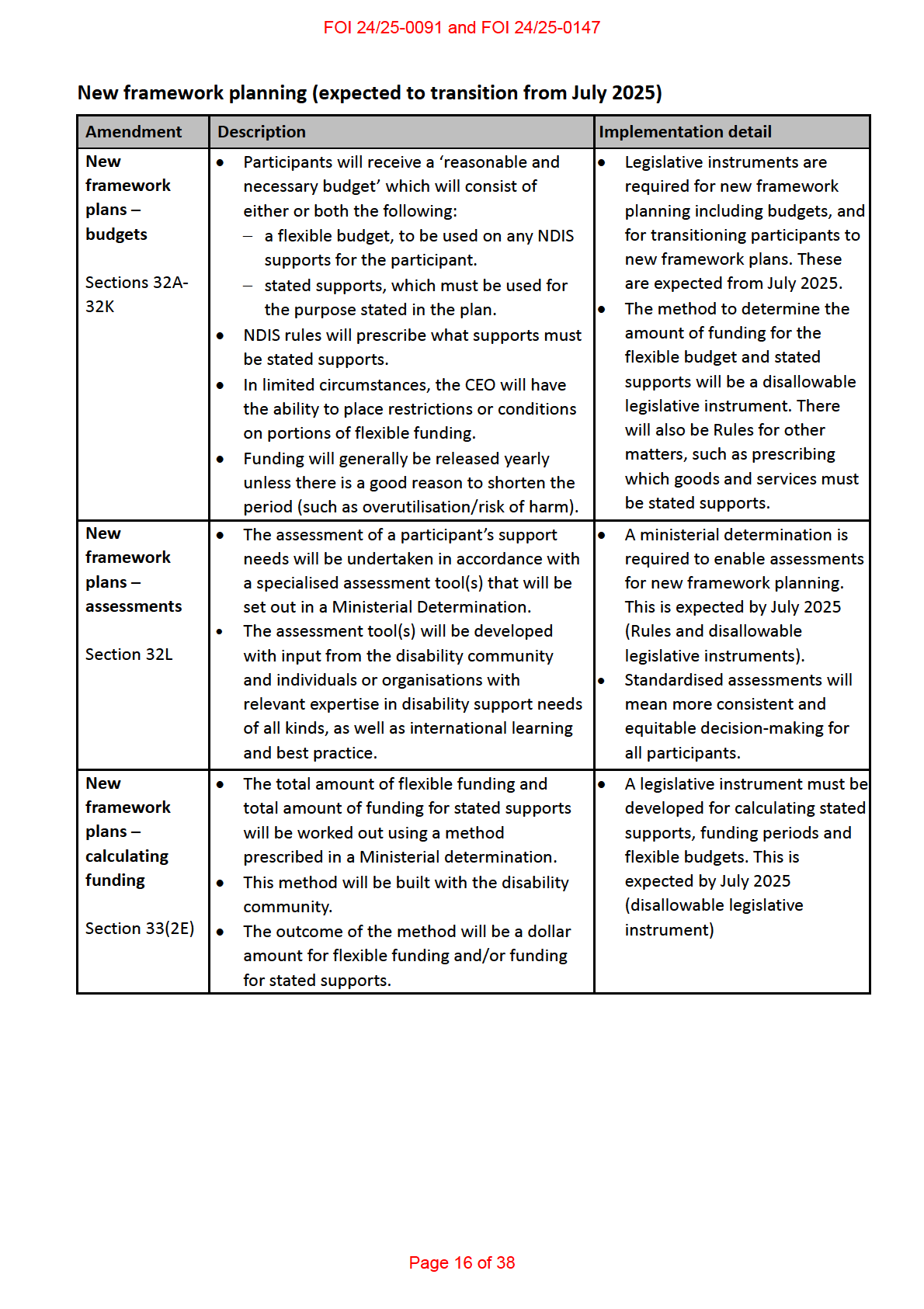
FOI 24/25-0091 and FOI 24/25-0147
NDIS AMENDMENT BILL HEARING
TITLE:
TRANSITIONAL ARRANGEMENTS
WITNESS: Mr Matthew Swainson, Acting Deputy Chief Executive Officer,
Governance, Risk and Legal
Strategic Narrative
• The NDIA is committed to working with the disability community and
continuing to put people with disability at the heart of NDIS reforms.
• To support implementation, the Independent Review of the NDIS
(NDIS Review) made a range of recommendations relating to
transitioning to a new planning approach, to ensure reforms are
implemented in coordination with other governments and include
opportunities for meaningful input from people with disability.
• The NDIS Review recommended the development of a 5-year
implementation roadmap, that sets out critical dependencies,
implementation risks, community engagement and necessary
legislative reforms.
• The NDIA wil work with the Department of Social Services (DSS), and
will engage people with disability, the disability sector, and all levels
of government to develop transition arrangements.
Transition arrangements in the Bil
• The National Disability Insurance Scheme Amendment (Getting the NDIS
Back on Track No. 1) Bill 2024 (the Bill) provides the scaffolding for
future reforms, in that it enables the development of a range of
legislative instruments enlivening the new Scheme arrangements.
• Section 32B of the Bil enables the Minister to create a legislative
instrument which determines the process by which participants wil
transition to ‘new framework’ plans. Under this instrument, the Minister
may identify classes of participants who are to receive new framework
plans within particular timeframes.
Page 17 of 38
FOI 24/25-0091 and FOI 24/25-0147
Reassessment for NDIS eligibility at the point of transition
• During the Senate Community Affairs Legislation Committee hearings,
witnesses raised concerns that transition of participants to new
framework plans may involve reassessing their eligibility for the Scheme.
• Transition of participants to new framework plans wil not require a
reassessment of eligibility for the NDIS.
Next steps
• Following the Australian Government’s formal response to the NDIS
Review and its recommendations, the NDIA and DSS wil develop a
transition roadmap to govern the development of new Scheme
arrangements and the transition of participants to new framework
plans.
• The NDIA anticipates the fol owing transition timeframes,
subject to the
passage and timing of passage of the Bil :
-
Changes to the NDIS Act: Following passage of the Bil , the NDIA
must immediately implement some changes to the Act, as they take
effect 28 days after receiving Royal Assent.
-
Priority legislative instruments: Some legislative instruments that
are necessary to support immediate improvements to the NDIS as
part of the Old Framework wil be prioritised for introduction from
when the changes to the Act come into effect in 2024.
-
Legislative instruments for new Scheme arrangements: Legislative
instruments required to support the broader changes to the NDIS
recommended by the NDIS Review wil be co--designed with the
disability community and are expected to be introduced from
July 2025.
-
Transition of participants: wil commence at this time and be phased
overtime for up to 5 years.
Page 18 of 38
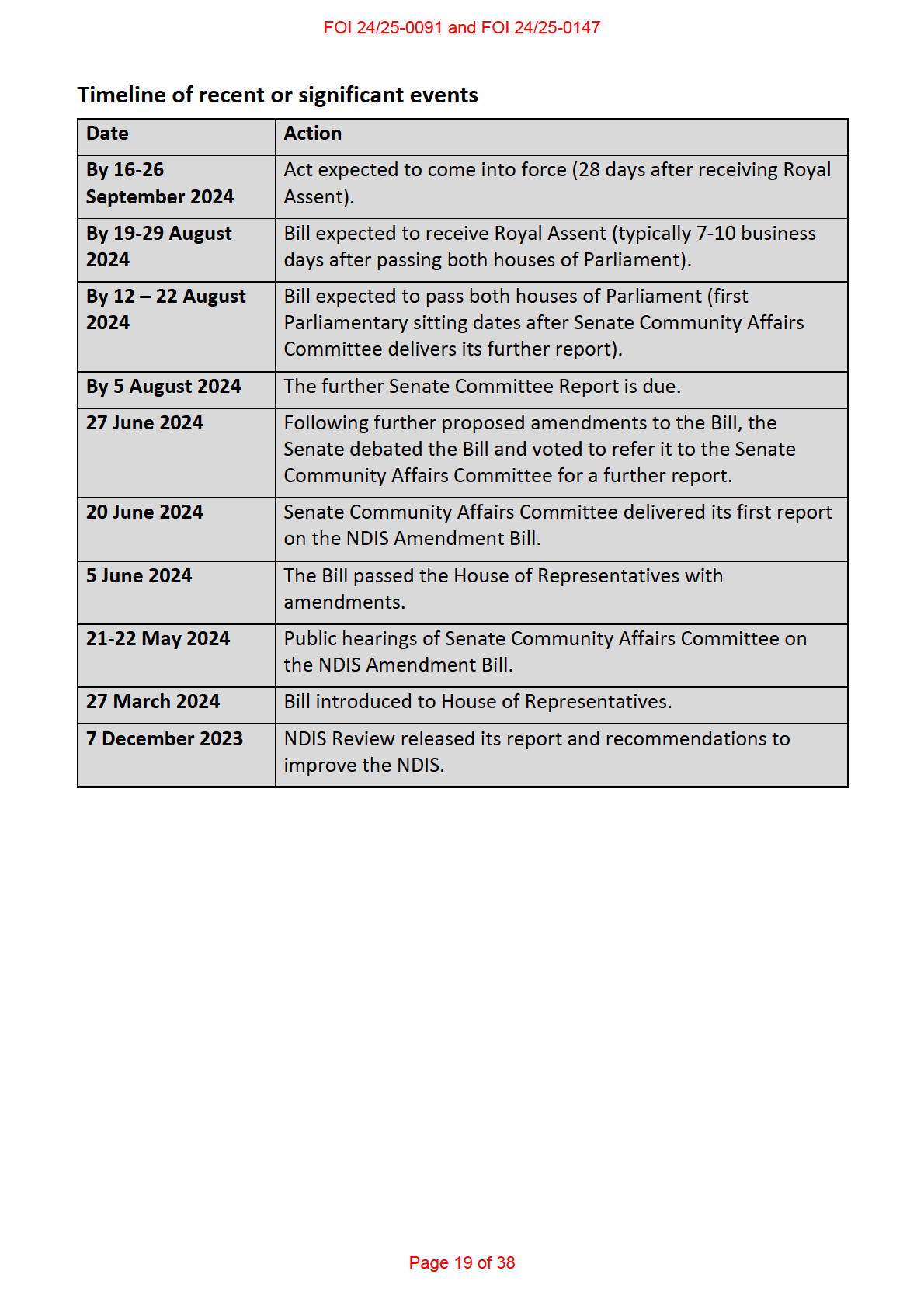
FOI 24/25-0091 and FOI 24/25-0147
Background
• On 7 December 2023, the NDIS Review delivered its recommendations for
reforming the NDIS.
• The Bil was introduced into the Australian Parliament on 27 March 2024.
• The Bil enables the development of legislative instruments setting out new
assessment and planning arrangements, as wel as the process by which
participants wil transition to new framework plans.
• NDIS Review recommendations 24, 25 and 26 contain a set of actions to manage
the transition to the new Scheme arrangements. These are:
-
Recommendation 24: Establish appropriate architecture to implement
reforms.
o Action 24.1 The Disability Reform Ministerial Council should agree
architecture to support implementation and delivery of
the NDIS reform agenda.
o Action 24.2 The new NDIS Review Implementation Advisory Committee
should report to the Disability Reform Ministerial Council every six months
or as needed.
o Action 24.3 The new NDIS Experience Design Office should commission
agile projects to design and test reforms to the participant pathway.
-
Recommendation 25: Coordinate and consult on amendments to relevant
legislation to enact proposed reforms.
o Action 25.1 The Department of Social Services, with input from the
National Disability Insurance Agency and NDIS Quality and Safeguards
Commission, should review the recommendations from this Review and
develop a proposed package of legislative reforms.
o Action 25.2 The Department of Social Services should undertake deep
public consultation and engagement on proposed package of legislative
reforms.
Page 20 of 38
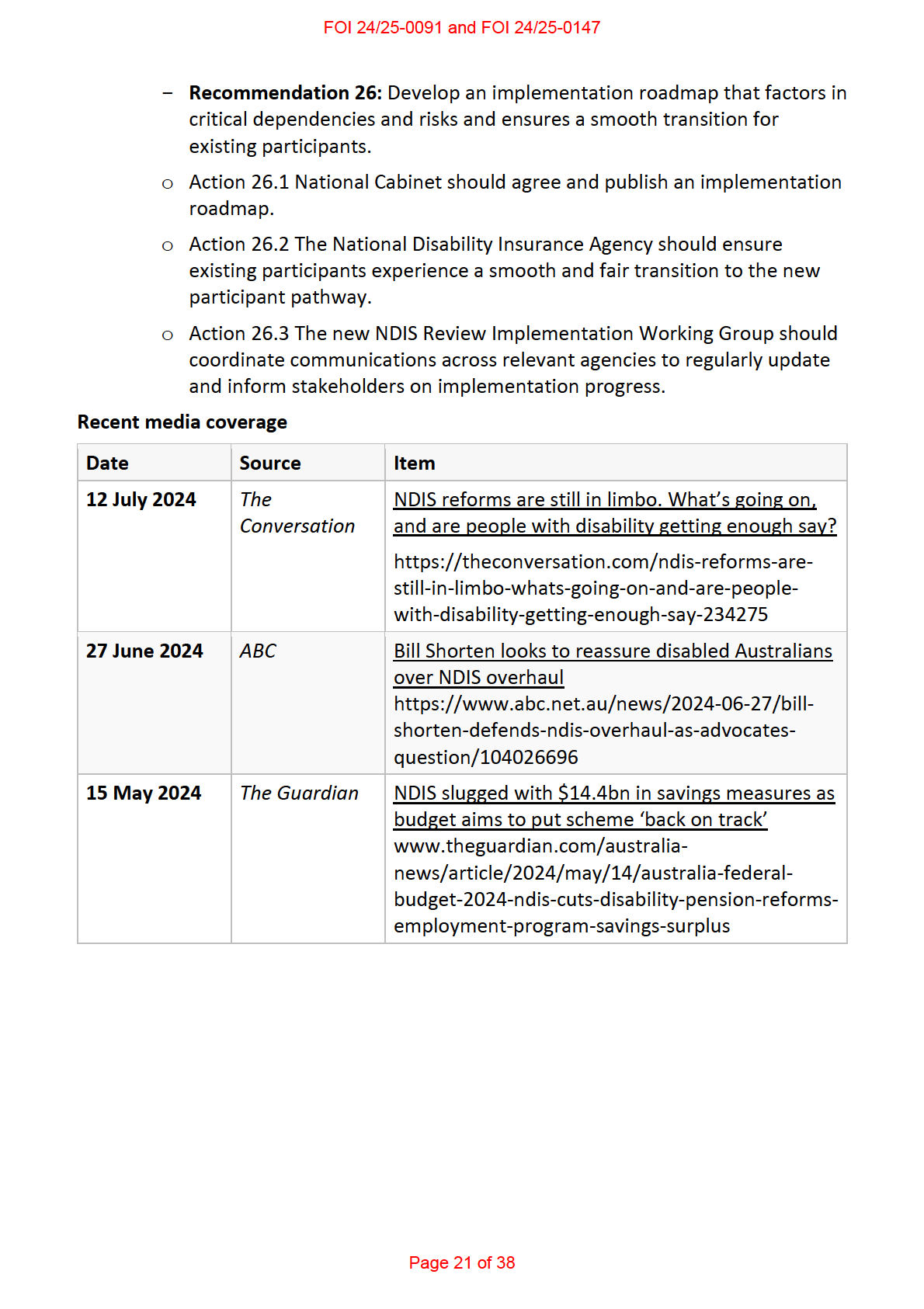

FOI 24/25-0091 and FOI 24/25-0147
NDIS AMENDMENT BILL HEARING
TITLE:
FRAUD AND COMPLIANCE (INCL FRAUD FUSION)
WITNESS: Mr Matthew Swainson, Acting Deputy Chief Executive Officer,
Governance, Risk and Legal
Strategic Narrative • The NDIA uses a risk-based escalation model to address financial non-
compliance.
• Responses first consider the potential impact to affected participants
and are then individual y tailored to the actions of the person or
business.
• The NDIA recognises there are a lot of good providers, doing the right
things, delivering high quality supports and services to participants.
• Providers and their employees who are caught doing the wrong thing on
purpose can be banned from providing supports and services for NDIS
participants. They could also go to jail for stealing money from NDIS
participant plans. Fraud against NDIS participants and the Scheme
is a crime.
• Fraud wil not be tolerated, and any type or amount of fraud is
unacceptable.
• As at 30 June 2024:
- There were
72 fraud investigations underway, with a total estimated
fraud value of
$34.5 mil ion,.
-
16 prosecutions are in progress involving
27 charged offenders, and
- Over
674 payment locks have been implemented on specific
providers to mitigate the risk of fraudulent claiming via those
providers.
• The NDIA received over
7,000 tip‐offs in the 3 months to 30 June 2024,
compared to
5,560 for the same period in 2022–23.
• At the October 2022–23 Budget, the Fraud Fusion Taskforce (FFT) was
announced with $126.3 mil ion in funding. The FFT continues to make
significant progress in improving the government’s capability to better
detect, respond and prevent fraud against the NDIS.
Page 23 of 38
FOI 24/25-0091 and FOI 24/25-0147
• An additional $48.3 mil ion of funding was provided in the 2023–24
Budget to crack down on fraud and non-compliant payments.
This funded additional integrity staff and the development of a business
case for Information and Communication Technology (ICT) systems to
detect, prevent and reduce non-compliant payments.
• On 18 February 2024, the Government announced initial funding of
$83.9 mil ion to improve the integrity of the NDIS through the Crack
Down on Fraud (CDoF) program. This included system uplifts described
in the business case.
• System improvements to be implemented through the CDoF Program
from January 2024 to December 2025, will deliver foundational,
minimum standard technological and business process uplifts, and
support capabilities to identify and prevent non-compliance and fraud in
the NDIS at scale, to make engaging with the Scheme ‘easier to get it
right, and harder to get it wrong’ for participants and providers.
• The CDoF program wil :
- build a new fraud case management system that wil interact with
other enforcement agencies,
- build new IT systems to connect with other agencies, providers, and
banks so transactions can be actioned faster with fewer errors,
- improve the systems that assess, process, and pay over 400,000
NDIS claims per day,
- improve identity proofing systems to increase safety and privacy, and
- improve the NDIS mobile app and online interfaces.
• This investment aligns with a key area of reform identified through the
Independent Review of the NDIS (NDIS Review) around concerns of
quality, safety, and integrity of the Scheme, and wil go towards giving
effect to the NDIS Review's recommendation that the Australian
Government should invest in the underpinning digital infrastructure and
capability needed to protect the integrity of the NDIS.
• The CDoF program also complements the work of the FFT and has been
designed to respond to areas of vulnerability that the FFT has identified
since it commenced.
Page 24 of 38
FOI 24/25-0091 and FOI 24/25-0147
• The program has already delivered a suite of measures to address
emerging and high-risk integrity issues to improve the integrity of the
Scheme.
• Whilst these integrity interventions can be chal enging for participants,
every measure is accompanied by a participant safety intervention to
ensure that participants are receiving appropriate supports.
Interventions are, where appropriate, accompanied by education to
minimise any potential future integrity risk.
• The NDIA recognises that stakeholder collaboration lies at the heart of
responsive policy. Consultation undertaken has clearly shown that
participants and other stakeholders (including peak bodies) have been
surprised by the level of non-compliance and fraud that continues to
undermine their safety and the Scheme sustainability. Consulted
stakeholders support proposed integrity improvements and associated
investment to protect participants and the Scheme's sustainability.
• The NDIA wil continue to consult with the disability community to
ensure that participants are fully supported in transitioning to the
improved systems.
Grouped Talking Points
Fraud Fusion Taskforce
• In October 2022,
$126.3 mil ion in funding was announced to establish
the Taskforce. This funding covers a 4-year period until 2025–26.
• The Taskforce funding provided a capability uplift of 147 full time
equivalent FFT officers across 14 Australian Government agencies.
• The Taskforce brings together the NDIA, Services Australia, and 18 other
Commonwealth agencies to better enable intel igence sharing,
identification and response to fraud perpetrated by serious organised
crime entities and others seeking to exploit the Australian Government’s
system of social supports.
Page 25 of 38
FOI 24/25-0091 and FOI 24/25-0147
• The Australian Skil s Quality Authority (ASQA), National Indigenous
Australians Agency (NIAA) and Professional Services Review (PSR)
recently joined the FFT, bringing the total number of FFT member
agencies to 20. The Agencies in the FFT are:
- National Disability Insurance Agency (co-lead)
- Services Australia (co-lead)
- Attorney-General’s Department (AGD) – Commonwealth Fraud
Prevention Centre (CFPC)
- Australian Taxation Office (ATO)
- Australian Criminal Intel igence Commission (ACIC) (responsible for
Fraud Fusion Intel igence Program and Fraud Fusion Centre)
- Australian Federal Police (AFP)
- NDIS Quality and Safeguards Commission (NDIS Commission)
- Australian Charities and Not-for-Profits Commission (ACNC)
- Australian Securities and Investments Commission (ASIC)
- Australian Transaction Reports & Analysis Centre (AUSTRAC)
- Commonwealth Director of Public Prosecutions (CDPP)
- Department of Employment and Workplace Relations (DEWR) (also
Government Payments Program [GPP] participating agency)
- Department of Veterans Affairs (DVA) (also GPP participating agency)
- Department of Education (DE) (also GPP participating agency)
- Department of Health & Aged Care (DHAC) (also GPP participating
agency)
- Department of Social Services (DSS)
- Australian Skills Quality Authority (ASQA)
- Professional Standards Review
- National Indigenous Australians Agency (NIAA)
- Tax Practitioner Board
Page 26 of 38
FOI 24/25-0091 and FOI 24/25-0147
Australian Criminal Intel igence Commission (ACIC) Fraud Fusion Centre
(FFC) and cross-agency secondments provide significant opportunities to
uplift capabilities which can be embedded into home agencies to improve
the strategic analysis of data to identify vulnerabilities, fraud and
operations.
• The NDIA is working col aboratively across al FFT agencies including the
AGD, ATO and Treasury to ensure lasting law reform can be made.
• The role of the FFT is to protect the NDIS and other Government
Payment Programs by improving the government’s capability to better
detect, respond and prevent fraud.
• Al NDIA investigations since 1 November 2022 are being progressed
under the Taskforce.
• With 20 government agencies now working together, the FFT has
investigated more than 100 cases in the first 18 months, with more than
$1 bil ion of NDIS funding under investigation over that time.
Crack Down on Fraud Program
• Integrity losses are a serious threat to the sustainability of the Scheme
and put participants at risk of not receiving the supports they rely on.
The CDoF program wil protect participants from those seeking to profit
from their NDIS plans and ensure that legitimate participants can
continue to access legitimate supports and services.
• This investment wil make it easier for participants to use and pay for
NDIS supports accurately, fairly, and transparently. It wil also make it
easier for legitimate providers to be appropriately paid for the services
they deliver.
• Since funding approval in February 2024, the CDoF program has been
actively mobilising its project teams to ensure resources are available to
deliver on milestones committed to government.
Page 27 of 38
FOI 24/25-0091 and FOI 24/25-0147
• The CDoF program has also delivered on the first priorities of immediate
integrity initiatives to implement measures to address emerging and
high- risk integrity issues. This work program may change quickly to
address changing priorities. From January to March 2024 the following
has been delivered:
-
Implementation of a payment delay –
implemented 16 March 2024 We have updated the timing of payments to participants and
providers to align with published payment standards. This means
that we have more time to assess claims prior to payment, and to
prevent unscrupulous actors from taking much needed funds away
from participants that require services and supports to meet their
goals.
-
Increased pre-payment checks on cash reimbursements –
implemented progressively from February 2024
Claims for cash reimbursements require evidence and are reviewed
before they are paid. This enhanced evidence and review process
provides confidence that cash reimbursements are being paid for
legitimate expenses.
-
Monitoring claims against expired plans –
implemented 12 February 2024
We have enhanced our comprehensive review process for claims
received after a plan has expired.
-
A campaign focused on participants that are unable to be
contacted – implemented March 2024
We are trialing a new approach to re-establishing contact with
participants that we have been unable to engage with through
existing channels. This approach is considering both participant
welfare and the financial integrity risks arising from being unable to
contact participants.
Page 28 of 38
FOI 24/25-0091 and FOI 24/25-0147
-
Piloting myGov in front of the NDIS app – implemented 4 March
2024
We are aligning with the whole of government approach which uses
the “myGov” service to access online systems from the Australian
Government. This wil create a familiar, consistent, and secure
experience for participants and nominees and help us make sure
we are talking to the right people about their services and supports.
Payment non-compliance
• The NDIA is responsible for protecting the NDIS from non-compliant and
fraudulent claiming behaviour resulting in the misuse of NDIS participant
funding.
• When claiming for NDIS supports, registered providers are expected to
comply with the requirements stated within the NDIS Pricing
Arrangements and Price Limits. The National Disability Insurance Scheme
Act 2013 states funded supports must be in accordance with the NDIS
participant's plan.
• The NDIA actively monitors and reviews risk-flagged made by registered
providers and NDIS participants. This monitoring includes the proactive
use of data and analytics, and tip- offs received via the NDIA’s Fraud
Reporting and Scams Helpline and email.
• Data analytics and risk profiles are used to identify potential y incorrect
claims, which are then reviewed on a case by case basis by compliance
officers who seek and review evidence and may cancel claims or take
other compliance action proportionate to the non- compliance.
• The NDIA’s Compliance and Enforcement Framework outlines the
principles adopted by the NDIA towards compliance and enforcement.
Page 29 of 38
FOI 24/25-0091 and FOI 24/25-0147
Tip-offs
• The NDIA has seen a year-on-year increase in the number of tip-offs
received via the Fraud Reporting and Scams Helpline and email.
• Al tip-offs received by the NDIA are assessed to determine the most
appropriate action required, including compliance activity where it is
al eged NDIS funds have been used inappropriately.
• The growth in tip-offs is driven by a range of factors including the growth
of the NDIS, the onboarding of NDIS participants and increased public
awareness and sentiment regarding the Scheme from greater exposure
of recent arrests, media, and Ministerial announcements.
Page 30 of 38
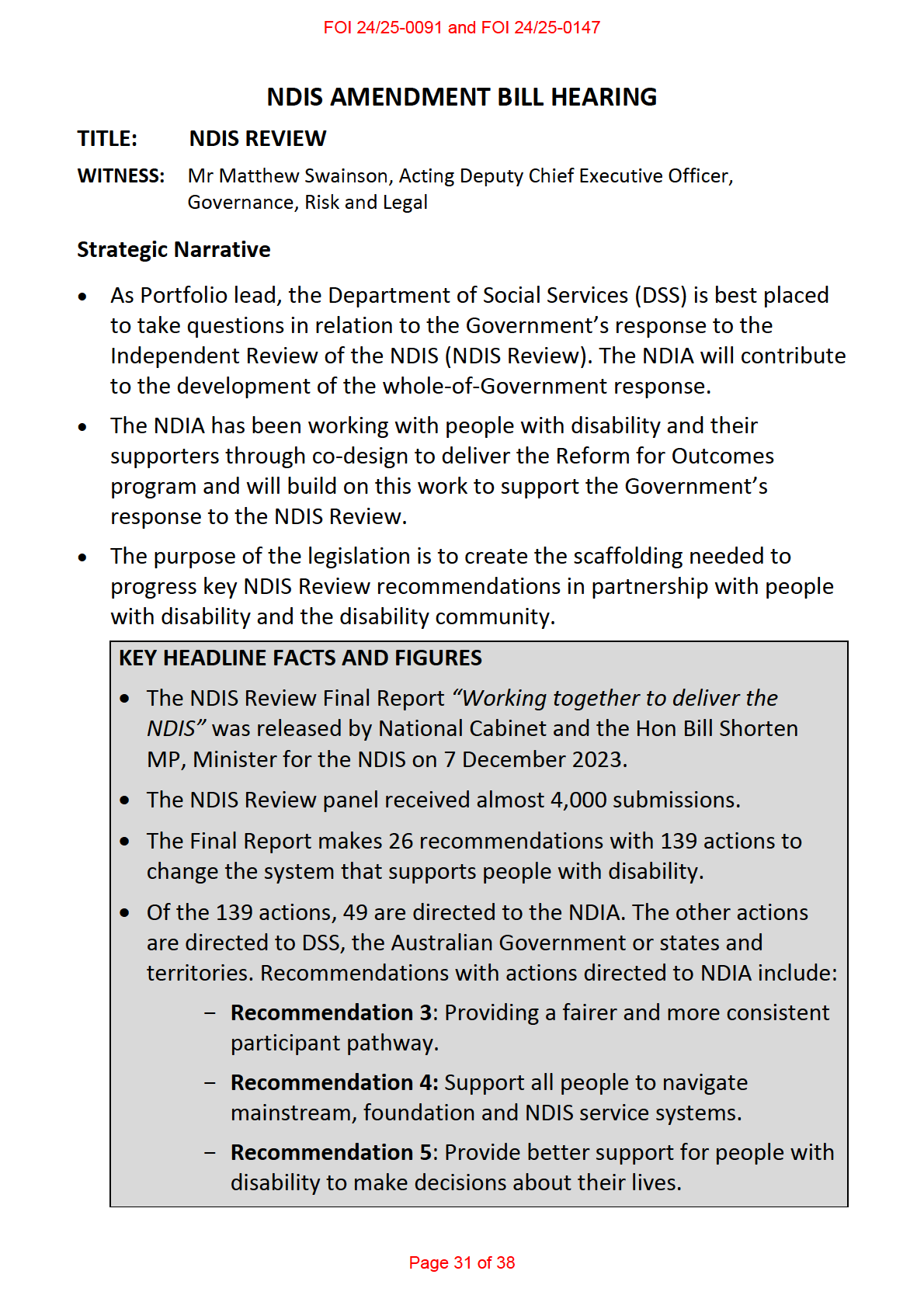
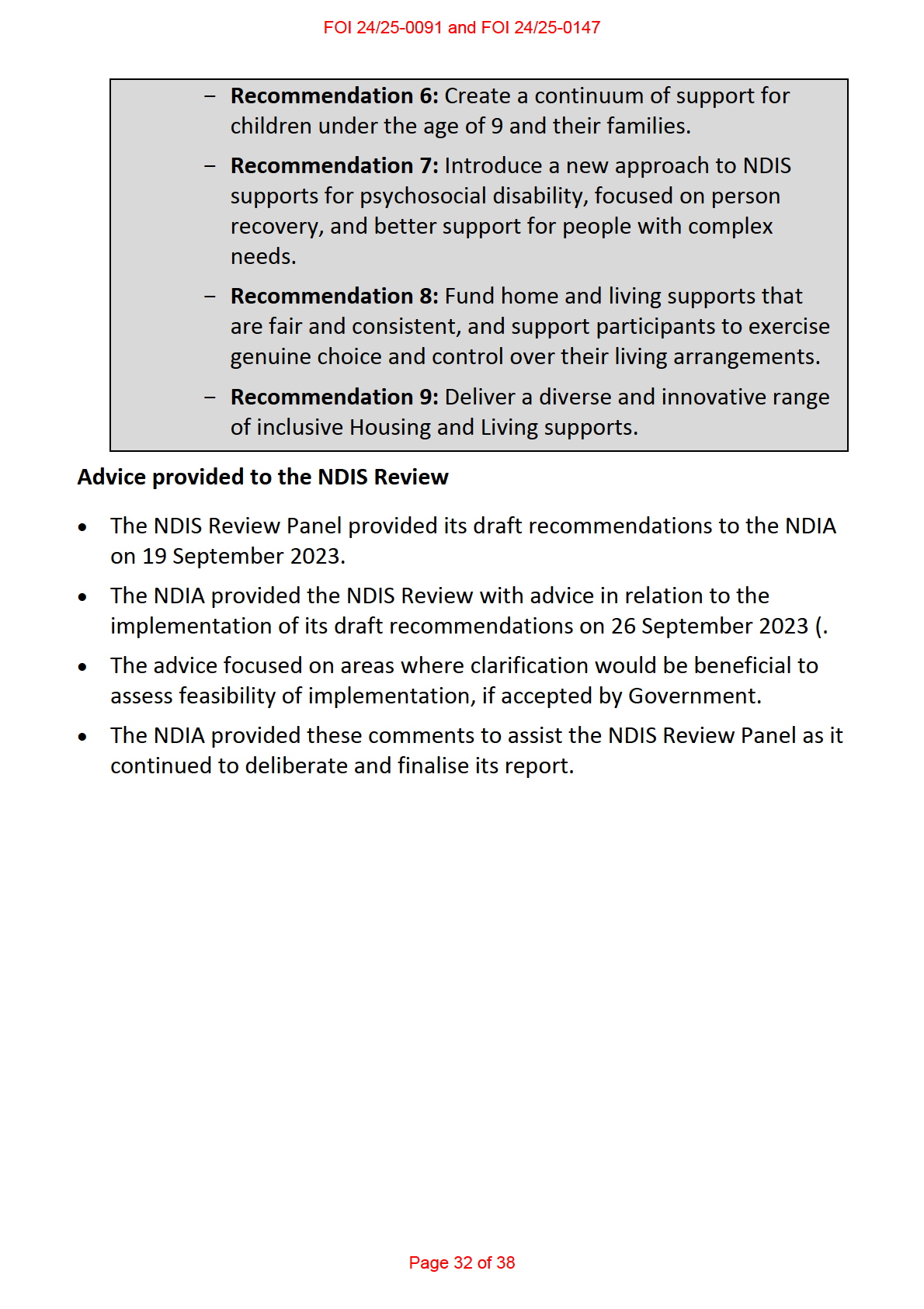
FOI 24/25-0091 and FOI 24/25-0147
RedBridge engagement on the Review
• The NDIA engaged RedBridge Pty Ltd (RedBridge) to understand
community perceptions and test communications messaging related to
areas of NDIS reform.
• We acknowledge in the past we have not effectively tested how to best
communicate with people with disability and their families on key areas
of the NDIS and undertook this research to help develop
communication.
• Effective communication is crucial to building confidence in change by
clearly explaining how we will improve the experience for participants
and providers.
• It is not unusual for government agencies to undertake research, to help
inform communications messaging.
• This research was not about informing policy approaches. The research
canvases a range of issues and areas of interest to people with disability.
These issues are not new and have always been wel known to the
disability community.
• We want the NDIS to be about people and not process. The market
research al owed us to hear the community’s views.
• RedBridge received the interim public report released by the NDIS
Review Panel in June 2023.
Page 33 of 38
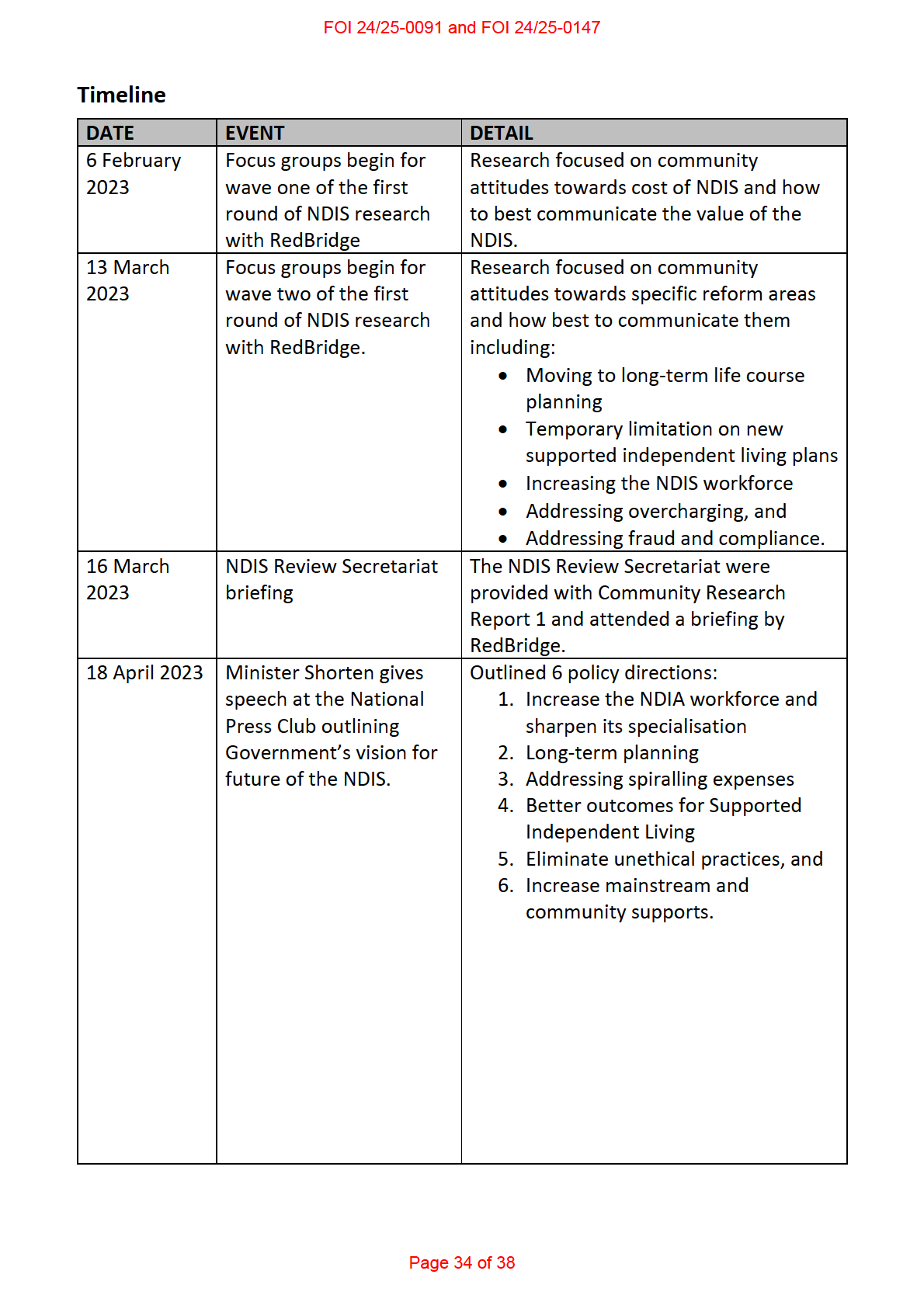
FOI 24/25-0091 and FOI 24/25-0147
9 May 2023
$910 mil ion Reform for
Included:
Outcomes Budget
Capability: $429.5 mil ion investment in
Announcement
the NDIA’s workforce capability and
systems resulting in better consistency
and equity in decision-making for access
and planning decisions for NDIS
participants.
Better planning: $73.4 mil ion to better
support participants to manage their plan
within budget, including assistance from
the NDIA during the year and holding
plan managers, support coordinators and
providers to account.
Flexibility: $63.8 mil ion to take a lifetime
approach to ensure plans are more
transparent and flexible for life events.
Independent living: $56.4 mil ion to
strengthen supported independent living
decisions, including by introducing a
home and living panel with highly trained
staff to improve consistency across
decisions and updating guidelines for
planners to improve participants' ability
to live independently.
30 June 2023 The NDIS Review releases The interim reports outline 5 key
its interim report.
chal enges including:
• Why is the NDIS an oasis in the
desert?
• What does reasonable and
necessary mean?
• Why are there many more children
in the NDIS than expected?
• Why aren’t NDIS markets working?
• How do we ensure the NDIS is
sustainable?
6 September Bruce Bonyhady gives
References foundational supports
2023
NDIS 2.0 speech in
Geelong and outlines the ndisreview.gov.au/resources/speech/ndis-
ten major reform areas
20
to be recommended by
the NDIS Review.
Page 35 of 38
FOI 24/25-0091 and FOI 24/25-0147
19
NDIA Chair and CEO are
September
provided the draft
2023
recommendations of the
NDIS Review via
Secretariat Head.
21
Focus groups begin for
This research round did not ask anything
September
wave one of the second specific about foundational supports or
2023
round of NDIS research
Supported Independent Living (SIL).
with RedBridge.
5 October
NDIS Review Secretariat The NDIS Review also attended briefings
2023 and 9
briefing
by RedBridge, on Community Research
October 2023
Report 3
16 October
Focus groups begin for
This research asked specific questions 3:1
2023
wave two of the second SIL and foundational supports.
round of NDIS research
with RedBridge.
1 November Joint briefing of NDIA
2023
Review chairs and
secretariat, NDIA Chair,
CEO and Minister on
research findings.
Assurance of data security and transfer to DSS
• There was a Memorandum of Understanding in place between the
Agency and the Department of the Prime Minister and Cabinet (PM&C)
for the provision of information to assist the Review. This included the
provision of Agency data.
• The Agency reviewed Secretariat data storage and transfer
arrangements to ensure that these met the Agency’s cybersecurity
requirements.
• The data provided by the Agency to PM&C during the course of the
Review has been retained by PM&C and not transferred to DSS.
Page 36 of 38
FOI 24/25-0091 and FOI 24/25-0147
Expert advisors engaged by the Review Panel
• The Secretariat also engaged Taylor Fry and the University of Melbourne.
Both these entities required access to Agency data to undertake the
work commissioned by the Panel.
• The Agency was consulted on those arrangements and entered into an
agreement with both entities to enable the transmission of data and to
ensure that the data was provided for the sole purposes of assisting the
Panel.
• The Agency reviewed cybersecurity and storage arrangements for both
entities and was satisfied that Agency data would be secure. Data was
required to be returned to the agency or destroyed within a defined
period under each agreement.
Information and support provided by the NDIA to the NDIS Review
• The NDIA provided information on request. This information was mainly
current policy documents, production of materials and data, guidelines
and operational information.
• Care was taken to ensure that the material provided directly addressed
the requests of the Panel, was factual in nature and options on issues
were provided only when specifical y requested by the Review.
Cost to the NDIA of supporting the Review
• The Agency established a smal team to co-ordinate Agency input to the
review – led by a Senior Executive Service Band 2 (with other
responsibilities), an Executive Level 2 and an Australian Public Service
Level 6.
• The Agency also contributed in-kind support in data analytics to the
Review.
• The costs of supporting the Review with the sourcing and compilation of
information and development of material as required from time to time
cannot be quantified. This was an extensive task which impacted al
parts of the Agency.
Page 37 of 38
